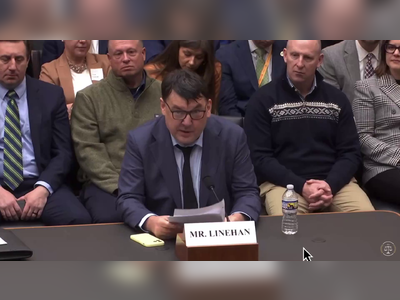US Court Ruling Signals Potential Sale of Silk Road's Bitcoin Stash
Judicial decision allows DOJ to liquidate 69,370 bitcoins seized from notorious dark web marketplace, impacting market valuation.
In a landmark ruling, a US federal judge has authorized the Department of Justice (DOJ) to proceed with the sale of 69,370 bitcoins, valued at approximately $6.5 billion, confiscated from the infamous Silk Road website.
The site, often referred to as the 'eBay of drugs', was notorious for its use of bitcoin as a primary payment method for illegal transactions and was shut down by authorities in 2013.
The court's decision came after Battle Born Investments, a company attempting to challenge the sale, failed in its legal endeavors.
The firm's claim was related to a bankruptcy inheritance and a recent unsuccessful case involving the Freedom of Information Act (FOIA), seeking the disclosure of 'Individual X', the person originally responsible for handing over the bitcoins, reported DB News.
Battle Born's legal representation sharply criticized the ruling, citing it as 'another egregious example of DOJ's abuse in the civil asset forfeiture process,' alleging that the government employed 'procedural gimmicks to ensure the facts are never heard.'
Notably, the DOJ emphasized the significant volatility in bitcoin's price as a rationale for seeking court permission to offload these assets.
A DOJ spokesperson indicated that the government would proceed 'in accordance with the ruling in this case.'
The case's outcome holds particular interest amid discussions by Donald Trump, the US President-elect.
During his campaign, Trump had pledged to integrate bitcoin into the Federal Reserve, contrary to selling them, and hinted at ambitions to establish the US as a leading hub for cryptocurrency.
The US is believed to possess upwards of 200,000 bitcoins seized from similar initiatives like Silk Road.
Following the court's announcement, bitcoin's value experienced a downturn, falling between $95,000 to $93,800.
Silk Road and Trump’s Cryptocurrency Agenda
Silk Road was a controversial platform on the dark web facilitating the trade of illicit goods such as drugs and weapons and utilized bitcoin as a payment method.
Created by Ross William Ulbricht, the US Justice Department asserts that the site generated $1.2 billion in transactions from February 2011 until its closure in July 2013.
After its shutdown in October that year, bitcoin's value plummeted from $130 to $85.
In February 2015, Ulbricht was sentenced for money laundering, computer hacking, and drug trafficking conspiracy, and is serving a life sentence without parole.
His name resurfaced in 2024 when Trump announced during his pro-crypto campaign that he would commute Ulbricht’s sentence if elected.
At a rally, Trump declared, "Vote for me, and on the first day, I will commute Ross Ulbricht's sentence.
He’s done 11 years, let’s bring him home." Ulbricht expressed his gratitude to Trump via a post on X: "Last night, Donald Trump promised to commute my sentence on day one if reelected.
Thank you.
Thank you.
Thank you.
After 11 years in prison, it's hard to express how I feel.
It’s thanks to your unwavering support that I may have a second chance."
Trump’s campaign also included promises to incorporate bitcoin into the Federal Reserve and suggested the prospect of the US emerging as the 'crypto capital of the planet.' In mid-September, he made headlines for using bitcoin to buy a hamburger in a New York bar and even launched his own cryptocurrency platform.
After Trump's electoral win, bitcoin's price surged past $100,000, driven partly by Elon Musk's appointment to the newly established Department of Government Efficiency in Trump's administration, an agency abbreviated as DOGE—a nod to the dogecoin cryptocurrency.
As events unfold, the financial world keenly observes the implications of the DOJ's asset sale on the volatile cryptocurrency market.
The site, often referred to as the 'eBay of drugs', was notorious for its use of bitcoin as a primary payment method for illegal transactions and was shut down by authorities in 2013.
The court's decision came after Battle Born Investments, a company attempting to challenge the sale, failed in its legal endeavors.
The firm's claim was related to a bankruptcy inheritance and a recent unsuccessful case involving the Freedom of Information Act (FOIA), seeking the disclosure of 'Individual X', the person originally responsible for handing over the bitcoins, reported DB News.
Battle Born's legal representation sharply criticized the ruling, citing it as 'another egregious example of DOJ's abuse in the civil asset forfeiture process,' alleging that the government employed 'procedural gimmicks to ensure the facts are never heard.'
Notably, the DOJ emphasized the significant volatility in bitcoin's price as a rationale for seeking court permission to offload these assets.
A DOJ spokesperson indicated that the government would proceed 'in accordance with the ruling in this case.'
The case's outcome holds particular interest amid discussions by Donald Trump, the US President-elect.
During his campaign, Trump had pledged to integrate bitcoin into the Federal Reserve, contrary to selling them, and hinted at ambitions to establish the US as a leading hub for cryptocurrency.
The US is believed to possess upwards of 200,000 bitcoins seized from similar initiatives like Silk Road.
Following the court's announcement, bitcoin's value experienced a downturn, falling between $95,000 to $93,800.
Silk Road and Trump’s Cryptocurrency Agenda
Silk Road was a controversial platform on the dark web facilitating the trade of illicit goods such as drugs and weapons and utilized bitcoin as a payment method.
Created by Ross William Ulbricht, the US Justice Department asserts that the site generated $1.2 billion in transactions from February 2011 until its closure in July 2013.
After its shutdown in October that year, bitcoin's value plummeted from $130 to $85.
In February 2015, Ulbricht was sentenced for money laundering, computer hacking, and drug trafficking conspiracy, and is serving a life sentence without parole.
His name resurfaced in 2024 when Trump announced during his pro-crypto campaign that he would commute Ulbricht’s sentence if elected.
At a rally, Trump declared, "Vote for me, and on the first day, I will commute Ross Ulbricht's sentence.
He’s done 11 years, let’s bring him home." Ulbricht expressed his gratitude to Trump via a post on X: "Last night, Donald Trump promised to commute my sentence on day one if reelected.
Thank you.
Thank you.
Thank you.
After 11 years in prison, it's hard to express how I feel.
It’s thanks to your unwavering support that I may have a second chance."
Trump’s campaign also included promises to incorporate bitcoin into the Federal Reserve and suggested the prospect of the US emerging as the 'crypto capital of the planet.' In mid-September, he made headlines for using bitcoin to buy a hamburger in a New York bar and even launched his own cryptocurrency platform.
After Trump's electoral win, bitcoin's price surged past $100,000, driven partly by Elon Musk's appointment to the newly established Department of Government Efficiency in Trump's administration, an agency abbreviated as DOGE—a nod to the dogecoin cryptocurrency.
As events unfold, the financial world keenly observes the implications of the DOJ's asset sale on the volatile cryptocurrency market.











